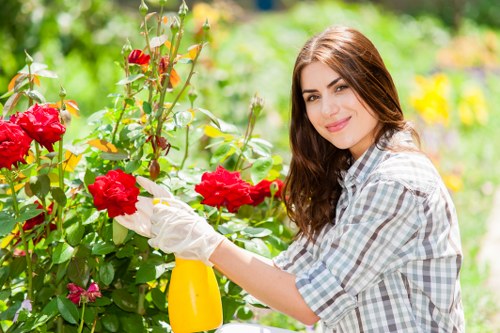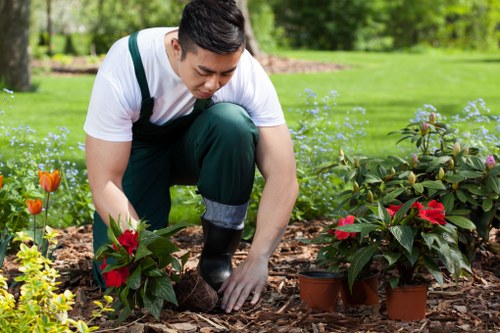Expert Garden Maintenance Services in Lewisham
Introduction to Garden Maintenance

Maintaining a beautiful garden in Lewisham requires dedication, knowledge, and the right set of skills. Whether you're a seasoned gardener or a beginner, understanding the fundamentals of garden maintenance is essential to keep your outdoor space thriving year-round.
Garden maintenance isn't just about aesthetics; it's also about creating a healthy environment for your plants. Proper care ensures that your garden remains a vibrant and sustainable space that you can enjoy for years to come.
In this article, we'll explore various aspects of garden maintenance in Lewisham, providing you with tips and insights to enhance your gardening experience.
Understanding the Lewisham Climate

Lewisham's climate plays a significant role in determining the best practices for garden maintenance. With its temperate maritime climate, the area experiences mild winters and warm summers, which influences plant selection and care routines.
Knowing the local climate helps in choosing plants that are well-suited to thrive in Lewisham's conditions. This ensures that your garden remains lush and healthy, reducing the need for excessive maintenance.
Additionally, understanding seasonal changes allows you to plan your gardening activities effectively, ensuring that your plants receive the right care at the right time.
Essential Garden Maintenance Tasks

Regular garden maintenance involves a series of tasks that keep your garden in optimal condition. Some of the essential tasks include:
- Pruning: Regular pruning helps maintain the shape and health of your plants.
- Weeding: Removing weeds prevents them from competing with your plants for nutrients and water.
- Lawn Care: Mowing, watering, and fertilizing your lawn are crucial for a green and healthy turf.
- Soil Management: Testing and amending the soil ensures that it provides the necessary nutrients for plant growth.
- Planting and Mulching: Proper planting techniques and mulching help retain moisture and suppress weed growth.
Choosing the Right Plants for Lewisham Gardens

Selecting the appropriate plants is fundamental to successful garden maintenance. In Lewisham, it's advisable to choose plants that are hardy and adapted to the local climate.
Consider a mix of perennials, annuals, and shrubs to create a diverse and resilient garden. Perennials offer多年生的多样性,确保全年景观的不断变化,而年度植物则可以为花园增添季节性色彩。
Furthermore, integrating native plants can enhance biodiversity and attract local wildlife, adding an extra layer of vibrancy to your garden.
Scheduling Your Garden Maintenance

A well-planned maintenance schedule is key to keeping your garden in top shape. Here's how you can structure your garden care routine:
- Spring: Focus on planting new specimens, pruning flowering shrubs, and preparing the soil.
- Summer: Maintain consistent watering, deadhead flowers, and manage pests.
- Autumn: Clean up fallen leaves, protect plants from frost, and plant bulbs for spring.
- Winter: Plan for the upcoming season, prune dormant plants, and protect sensitive species.
By following a seasonal schedule, you ensure that each aspect of garden maintenance receives the attention it needs.
Professional Garden Maintenance Services
Benefits of Hiring Professionals
While DIY garden maintenance can be rewarding, hiring professional services in Lewisham offers numerous advantages:
- Expertise: Professionals bring specialized knowledge and experience to handle various gardening challenges.
- Time-Saving: Outsourcing maintenance tasks frees up your time to enjoy your garden rather than work on it.
- Quality Results: Professional services ensure high-quality care, enhancing the beauty and health of your garden.
- Customized Care: Experts can tailor their services to meet the specific needs of your garden.
Choosing a reputable garden maintenance provider can make a significant difference in the overall appeal and sustainability of your outdoor space.
Eco-Friendly Garden Maintenance Practices
Sustainable Gardening Techniques
Embracing eco-friendly practices not only benefits the environment but also contributes to a healthier garden. Some sustainable techniques include:
- Composting: Recycling garden waste into compost enriches the soil naturally.
- Rainwater Harvesting: Collecting rainwater reduces dependence on municipal water supplies.
- Natural Pest Control: Using biological methods to manage pests minimizes chemical usage.
- Native Planting: Incorporating native species supports local ecosystems and reduces maintenance needs.
Implementing these practices can lead to a more resilient and eco-friendly garden.
Tools and Equipment for Garden Maintenance
Essential Gardening Tools
Having the right tools is essential for efficient garden maintenance. Some must-have tools include:
- Pruners and Shears: For trimming and shaping plants.
- Garden Fork and Trowel: For soil turning and planting.
- Lawn Mower: To keep your lawn neat and well-groomed.
- Watering Equipment: Sprinklers, hoses, and watering cans ensure your plants receive adequate moisture.
- Wheelbarrow: Facilitates the movement of soil, plants, and tools around the garden.
Investing in quality tools can significantly enhance your efficiency and the overall health of your garden.
Seasonal Gardening Tips for Lewisham
Spring Gardening Tips
As the weather warms up, it's time to prepare your garden for the growing season. Here are some spring tips:
- Clean Up: Remove any debris from the winter months to prevent pests and diseases.
- Soil Testing: Assess soil pH and nutrient levels to make necessary amendments.
- Planting: Sow seeds and transplant seedlings for a vibrant spring display.
- Mulching: Apply mulch to retain moisture and suppress weed growth.
Implementing these tips ensures a strong start to the gardening year.
Pest and Disease Management
Identifying Common Pests
Effective garden maintenance includes managing pests and diseases that can harm your plants. Common pests in Lewisham gardens include:
- Aphids: Small insects that weaken plants by sucking sap.
- Slugs and Snails: Mollusks that feed on tender plant parts.
- Japanese Beetles: C-shaped beetles that feed on a wide range of plants.
- Fungal Diseases: Such as powdery mildew and rust that affect plant health.
Implementing integrated pest management strategies can help control these issues sustainably.
Pruning Techniques for Healthy Growth
Proper Pruning Methods
Pruning is vital for maintaining plant health and aesthetics. Here are some tips for effective pruning:
- Timing: Prune at the right time of year for each plant species.
- Tools: Use sharp, clean tools to make precise cuts.
- Technique: Remove dead or diseased branches and shape the plant for optimal growth.
- Thinning: Allow light and air to penetrate the canopy, promoting healthier growth.
Proper pruning encourages robust growth and enhances the overall structure of your plants.
Lawn Care and Maintenance
Achieving a Perfect Lawn
A well-maintained lawn adds to the beauty of your garden. Key lawn care practices include:
- Mowing: Regular mowing keeps the grass at an optimal height, promoting dense growth.
- Watering: Ensure consistent watering, especially during dry periods.
- Fertilizing: Apply appropriate fertilizers to provide essential nutrients.
- Aeration: Aerate the soil to improve water and nutrient absorption.
Consistent lawn maintenance results in a lush, green, and inviting outdoor space.
Irrigation Systems for Efficient Watering
Choosing the Right Irrigation System
Efficient watering is crucial for garden health. Selecting the right irrigation system can save time and resources. Options include:
- Drip Irrigation: Delivers water directly to the plant roots, minimizing waste.
- Sprinkler Systems: Ideal for covering larger areas like lawns and flower beds.
- Soaker Hoses: Provide gentle watering for garden beds and shrubs.
- Rain Barrels: Collect rainwater for sustainable watering practices.
Implementing an effective irrigation system ensures your plants receive adequate moisture while conserving water.
Soil Health and Fertilization
Enhancing Soil Quality
Healthy soil is the foundation of a thriving garden. Maintain soil health by:
- Composting: Adding organic matter enriches the soil and improves structure.
- Mulching: Retains moisture and suppresses weeds.
- Crop Rotation: Prevents nutrient depletion and reduces pest buildup.
- pH Testing: Adjust soil pH to suit specific plant needs.
Regularly monitoring and enhancing soil quality leads to robust plant growth and a sustainable garden ecosystem.
Mulching for Moisture and Weed Control
Benefits of Mulching
Mulching offers several benefits for garden maintenance:
- Moisture Retention: Keeps the soil moist by reducing evaporation.
- Weed Suppression: Prevents weed seeds from germinating and growing.
- Temperature Regulation: Insulates the soil, keeping it cooler in summer and warmer in winter.
- Soil Improvement: As mulch decomposes, it adds organic matter to the soil.
Applying mulch is a simple yet effective way to enhance your garden's health and reduce maintenance efforts.
Dealing with Seasonal Pests
Pest Control Strategies
Seasonal pests can pose significant challenges to garden maintenance. Effective strategies include:
- Monitoring: Regularly inspect plants for signs of pest activity.
- Natural Predators: Encourage beneficial insects like ladybugs and lacewings.
- Barriers: Use netting or row covers to protect plants from pests.
- Organic Sprays: Apply neem oil or insecticidal soap to manage infestations.
Implementing these strategies helps maintain a healthy garden with minimal pest interference.
Winterizing Your Garden
Preparing for the Cold Season
Winterizing your garden ensures that it survives the colder months intact. Steps include:
- Pruning: Remove dead or diseased branches before winter sets in.
- Protecting Plants: Use frost covers or mulch to shield sensitive plants.
- Cleaning: Clear the garden of fallen leaves and debris to prevent disease buildup.
- Planning: Evaluate the past season and plan for future growth.
Proper winter preparation safeguards your garden against harsh weather conditions, promoting a healthy start in spring.
Innovative Garden Design Ideas
Enhancing Aesthetic Appeal
Creative garden design can transform your outdoor space into a stunning retreat. Consider incorporating:
- Vertical Gardens: Utilize walls and fences to grow plants vertically, saving space and adding visual interest.
- Water Features: Install fountains or ponds to create a calming ambiance.
- Pathways: Design garden paths with materials like gravel, stone, or wood for both functionality and beauty.
- Lighting: Use outdoor lighting to highlight key features and extend garden enjoyment into the evening.
Integrating these elements enhances the overall beauty and functionality of your garden, making it a delightful space for relaxation and entertainment.
Gardening for Biodiversity
Supporting Local Ecosystems
Encouraging biodiversity in your garden benefits the environment and promotes a healthier ecosystem. Ways to support biodiversity include:
- Plant Diversity: Grow a variety of plant species to attract different pollinators and wildlife.
- Habitat Creation: Provide habitats for birds, insects, and other beneficial creatures.
- Avoid Chemicals: Minimize the use of pesticides and herbicides to protect natural habitats.
- Composting: Recycle organic waste to enrich the soil and support soil organisms.
Fostering biodiversity makes your garden more resilient and contributes positively to the local environment.
Maintaining Garden Structures
Caring for Fences, Decks, and Patios
Garden structures like fences, decks, and patios require regular maintenance to ensure longevity and safety. Key maintenance tips include:
- Cleaning: Remove dirt, moss, and debris to prevent damage.
- Repairing: Fix any broken or deteriorated parts promptly.
- Sealing and Staining: Protect wooden structures from moisture and pests with appropriate sealants.
- Inspection: Regularly inspect structures for signs of wear and tear.
Proper maintenance of garden structures enhances their appearance and functionality, contributing to the overall appeal of your garden.
Sustainable Gardening Practices
Eco-Friendly Approaches
Adopting sustainable gardening practices is crucial for environmental conservation and garden health. Some eco-friendly approaches include:
- Organic Gardening: Use natural fertilizers and pest control methods to reduce chemical usage.
- Water Conservation: Implement efficient watering systems and drought-resistant plants.
- Recycling: Reuse garden materials and compost organic waste.
- Energy Efficiency: Use solar-powered garden lights and tools to minimize energy consumption.
Integrating these sustainable practices creates a garden that is both beautiful and environmentally responsible.
Choosing the Right Garden Maintenance Plan
Tailoring Services to Your Needs
Every garden is unique, and so are its maintenance requirements. When selecting a garden maintenance plan in Lewisham, consider:
- Garden Size: Larger gardens may require more comprehensive services.
- Plant Types: Specific plants may need specialized care.
- Budget: Choose a plan that offers the best value within your budget.
- Frequency: Determine how often you need maintenance services.
By assessing your garden's specific needs, you can select a maintenance plan that ensures optimal health and beauty.
Conclusion
Enhance Your Lewisham Garden Today
Effective garden maintenance in Lewisham involves a combination of understanding the local climate, selecting the right plants, and implementing sustainable practices. Whether you choose to maintain your garden yourself or hire professional services, the key is consistency and attention to detail.
By following the tips and strategies outlined in this article, you can create a thriving and beautiful garden that serves as a sanctuary for relaxation and enjoyment.
Contact us today to book your garden maintenance service and transform your outdoor space into a lush, vibrant haven.